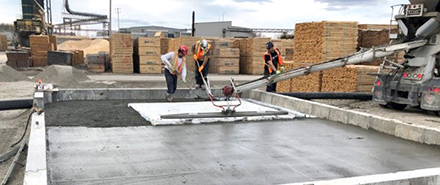Resolute announced the construction of a commercial plant specializing in the production of cellulose filaments at its Kénogami (Québec) paper mill in 2020. Also known as nanofibrilated cellulose (NFC), cellulose filaments are a novel, 100% natural biomaterial additive made from wood. This material can be used to enhance the technical and environmental performance of a variety of products, such as concrete and plastics. Source: Timberbiz
Resolute’s first concrete steps in the development of this new and exciting material took place in 2014, when Resolute Forest Products in Canada and Mercer International launched Performance Biofilaments, a joint venture focused on commercialization of nanofibrillated cellulose in new and novel applications where it can deliver significant value in applications such as concrete, plastics, rubbers and industrial fluids.
Resolute thinks that entering non-traditional markets implies not only innovating in research and commercialization, but also displaying an appetite for taking measured risks to accelerate the deployment of novel, environmentally friendly solutions.
Resolute and its partner Performance Biofilaments commissioned the first commercial trial of a cellulose-filaments enhanced industrial concrete slab as part of Resolute’s Senneterre sawmill expansion. With the help of concrete supplier Béton Barette, general contractor Hardy construction and durability engineering consultant SIMCO Technologies, twin slabs of concrete were poured on the Senneterre site in late 2022.
One contained cellulose filaments and the other used a traditional concrete mix.
The objectives were to demonstrate the effectiveness of cellulose filaments developed by Performance Biofilaments as an anti-shrinkage agent, as well as to validate the mixing and pouring sequence on a jobsite.
The company came away with important findings that showed the tremendous potential of cellulose filaments and confirmed that its product helps control the evaporation of water, which reduces cracking during the initial curing of fresh concrete.
Over time, Resolute will also validate the effect of filaments on the durability of the concrete slab. For example, in Quebec’s climate, low-porosity concrete slows the diffusion of chlorides from the use of de-icing salts. The result is a reduction in the probability that reinforcement bars will corrode and an increase in the overall durability of concrete.
The benefits of cellulose filaments can add up, from the environmental standpoint and in terms of infrastructure management, especially large structures.
The innovative approach to resource transformation involves working with industry partners to turn existing base materials, such as kraft pulp, toward beneficial uses.
The extraction technology used to produce cellulose filaments was developed by FPInnovations, a private, not-for-profit organization that creates solutions to support the Canadian forest sector’s global competitiveness and counts Resolute as a member.
“When we look at the horizon of what is possible, our experience at the Senneterre sawmill shows we’re on the right track,” said Alain Bourdages, Resolute’s vice president, Innovation and Energy.
“Our initial testing shows that we are indeed advancing the value-added transformation of wood fibre into a 100% natural specialty additive for products such as concrete and markets such as construction. What we have here is a performance-enhancing biobased material. This is a truly exciting initiative.”
Resolute is looking forward to carrying out more projects with various partners and expanding the scale of the testing.






